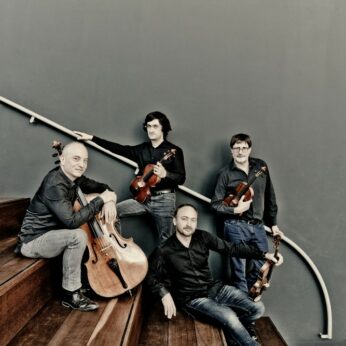Composer: Mieczyslaw Weinberg (b. 1919 - d. 1996)
Performance date: 01/07/2022
Venue: St. Brendan’s Church
Composition Year: 1966
Duration: 00:21:17
Recording Engineer: Simon Cullen, Ergodos
Instrumentation: 2vn, va, vc
Instrumentation Category:String Quartet
Artists:
Quatuor Danel (Marc Danel, Gilles Millet [violins], Vlad Bogdanas [viola], Yovan Markovitch [cello] -
[quartet]

Mieczysław Weinberg [1919-1996]
String Quartet No.11 in F major Op.89 [1966]
1. Allegro assai
2. Allegretto
3. Adagio semplice
4. Allegro leggiero
This delightful, intimate and joyful Quartet is dedicated to Weinberg’s daughter Victoria and therein lies the secret to its open, transparent texture and its witty asides. Nothing is ever straightforward with Weinberg and this Quartet has a couple of strange features, two-and-a-half of its movements are played with mutes and he plays with the very idea of a string quartet by giving over large portions of the unmuted slow movement to unaccompanied solos.
The opening Allegro assai takes off at great speed with its cheerful ditty whose fragments are then tossed around accompanied by warning growls from the cello. This very short exposition is then repeated. The development kicks off with the cello playing the ditty, quickly leading to one of Weinberg’s sudden outbursts, sounding like nothing less than a major family row driven by ferocious pizzicatos and slammed doors. When all fury is spent a more civilised conversation follows, flaring up from time to time, before a deliciously witty coda. Shostakovich’s Seventh Quartet from several years earlier had been written in memory of his first wife including in it images of their family life together. It feels as though Weinberg is here making music from family secrets.
The Allegretto is a double Scherzo and Trio. The opening theme could almost be a nursery rhyme. The Trios are plain bizarre, contrasting almost inaudible chorales with violent outbursts of his favourite pizzicatos. The overall effect is operatic with different characters presenting themselves – in great style one might add.
Weinberg’s Finales get increasingly strange. This one has been described as spending much of its time in post-traumatic bemusement, bearing in mind he was writing his Holocaust opera The Passenger at this time. Fragments of themes are passed around as if in conversation with each other. Right at the end the music comes out of its shell in a clumsy waltz as if to recall the earlier mood.
There’s a description by Grigori Frid, whose Viola Sonata will be played tomorrow, a description of Weinberg on his release from the Lubyanka: He was shaven-headed, he had lost weight, but otherwise he was just as I always saw after the triumphant premieres of his works – quiet, with a frightened beaming expression, concealing his large hands in the sleeves of his jacket, all the time as it were cringing and quietly murmuring: ‘Well then….well…it’s all right’.
Francis Humphrys
Copyright © 2025 West Cork Music. All rights reserved.
Designed and developed by Matrix Internet